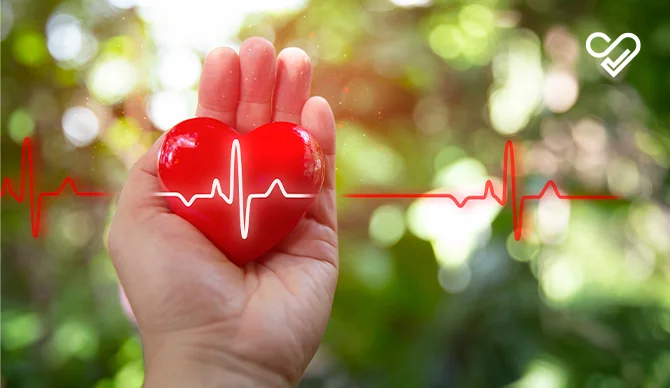Do you remember experiencing a racing heart, sweaty palms, and a sense of impending doom? – When going through such moments, it’s completely natural to be unsure and wonder if it’s AFib or panic attack?
Being able to identify between the two conditions is immensely important in order to effectively manage your heart health.
Let’s explore AFib vs Panic Attacks – revealing what they are, their causes, symptoms, and the possible treatment options.
Table of contents
Is It AFib or Panic Attack?
Atrial Fibrillation (AFib)
Atrial fibrillation, also known as AFib, is a common heart condition characterized by irregular and rapid heartbeats. Normally, electrical signals of the heart coordinate its contractions, ensuring a steady flow of blood. However, in AFib, these signals become chaotic and uncoordinated, causing the heart’s upper chambers (atria) to quiver instead of contracting properly.
Panic Attack
On the other hand, a panic attack is a sudden onset of intense fear or discomfort, often accompanied by physical symptoms such as rapid heartbeat, sweating, trembling, and breathlessness. Unlike AFib, which is a cardiac condition, panic attacks are primarily psychological in nature, which can be triggered by stress or anxiety.
AFib vs Panic Attack: Symptoms
AFib Symptoms:
- Irregular heartbeat (palpitations)
- Rapid heartbeat (tachycardia)
- Fatigue
- Dizziness or lightheadedness
- Shortness of breath
- Chest pain or discomfort
Panic Attack Symptoms
- Intense fear or dread
- Rapid heartbeat (palpitations)
- Sweating
- Trembling or shaking
- Shortness of breath
- Chest pain or discomfort
- Nausea or abdominal distress
Heart Rate During a Panic Attack
During a panic attack, the body’s natural “fight or flight” response is activated, leading to increased adrenaline, which also increases the heart rate, as the body prepares to respond to perceived danger. In some cases, heart rate may even exceed 100 beats per minute, mimicking the symptoms of AFib.
AFib vs Panic Attack: Causes
AFib Causes:
- Age (particularly over 65)
- High blood pressure
- Heart disease or structural abnormalities
- Thyroid disorders
- Obesity
- Excessive alcohol consumption
- Sleep apnea
Panic Attack Causes:
- Stressful life events
- Genetics (family history of anxiety disorders)
- Trauma or PTSD
- Major life changes
- Substance abuse (e.g., caffeine, nicotine, drugs)
How To Treat Atrial Fibrillation?
Treating AFib aims to control heart rate, restore normal heart rhythm, and minimize the risk of complications such as stroke. Based on how severe the condition is, treatment options may involve:
-
Medications:
- Antiarrhythmic Drugs: These medications help regulate the heart’s rhythm by controlling the electrical impulses that cause AFib.
- Rate Control Drugs: These medications slow down the heart rate to a normal range, reducing symptoms such as palpitations and fatigue.
- Anticoagulants: AFib increases the risk of blood clots and stroke. Anticoagulant medications help prevent clot formations by thinning the blood.
-
Cardioversion:
- Electrical Cardioversion: Often performed under sedation or anesthesia, this procedure involves delivering an electrical shock to the heart to restore normal sinus rhythm.
- Chemical Cardioversion: Medications such as amiodarone or ibutilide may be administered intravenously to help convert AFib to a normal heart rhythm.
-
Catheter Ablation:
- Catheter ablation is a minimally invasive procedure used to selectively destroy abnormal heart tissues that are responsible for triggering AFib. It involves threading thin, flexible wires (catheters) through blood vessels to the heart and using heat or cold energy to create scar tissues that disrupt faulty electrical pathways.
-
Surgical Maze Procedure:
- The Maze procedure is a surgical intervention performed during open-heart surgery. It involves creating a series of precise incisions or scars in the atria to redirect electrical impulses and restore normal rhythm.
-
Watchman Device Implantation:
- For individuals at high risk of stroke who cannot tolerate long-term anticoagulant therapy, the Watchman device may be implanted in the left atrial appendage to prevent blood clots from entering the bloodstream.
How To Treat a Panic Attack?
Management of panic attacks often involves:
-
Cognitive-Behavioral Therapy (CBT):
- CBT is a psychotherapeutic approach that focuses on identifying and challenging negative thought patterns and behaviors associated with panic attacks. Through CBT, individuals learn coping strategies to manage symptoms, such as relaxation techniques, cognitive restructuring, and exposure therapy.
-
Medications:
- Benzodiazepines: These medications are fast-acting and can help get rid of acute symptoms of panic attacks, such as anxiety and agitation. However, they are typically prescribed for short-term use due to the risk of dependence and tolerance.
- Selective Serotonin Reuptake Inhibitors (SSRIs): SSRIs are a class of antidepressant medications that are commonly used to treat panic disorder and other anxiety disorders. They work by increasing the levels of serotonin in the brain, which helps regulate mood and reduce anxiety symptoms.
-
Relaxation Techniques:
- Techniques such as deep breathing exercises, progressive muscle relaxation, and mindfulness meditation can help individuals manage stress and anxiety, reducing the frequency and intensity of panic attacks. These techniques promote relaxation and can be practiced regularly to build resilience against panic attacks.
-
Support Groups:
- Joining a support group or seeking therapy with others who have experienced similar challenges can provide valuable emotional support, validation, and coping strategies for managing panic attacks.
Disclaimer
This blog is for informational & educational purposes only, and does not intend to substitute any professional medical advice or consultation. For any health related concerns, please consult with your physician, or call 911
